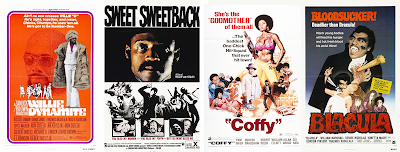As a white suburban kid in the 1970s during the golden era of Blaxploitation, I didn’t come into contact with any of these films. They may have played my local drive-in, but I wasn’t seeing them. If what I was seeing in the pages of Cracked and Crazy magazines could be believed, however, these movies were mostly playing urban centres, and they all shared one common message: “Let’s get honky!”
The latter wasn’t true, of course, but it was a reading that obviously a lot of white people were making of Blaxploitation movies at the time, and it may also have been a reaction to the fact that movies made by black filmmakers and starring black actors were vying for screens alongside the usual white-centric films. Regardless, the message that was being passed along to pre-teen me was that these movies were clearly dangerous, at least to a little suburban white kid.
Eventually, I caught one of the Shaft movies on TV, and I was surprised to find myself getting into it, and responding positively to Richard Roundtree’s John Shaft. Maybe there was more to these movies than what the comedy magazines of the day were pitching.
During the 1980s, Blaxploitation movies made their way into suburbia and rural areas via home video. Unfortunately, that was also the decade when the concept of B-Movies took on a new life, meaning “so bad, they’re good”, and so all art, especially that from any earlier time period, was subjected to a sort of “we're above it” mentality. It was through this lens that I experienced Black Belt Jones.
Despite that, times change, people change. Hopefully, we all develop a better understanding of, if not communities specifically, then of the need for communities to have their own and equally valid modes of communication, expression and storytelling. Blaxploitation, after speaking to the black community first and foremost, can be an invitation to others to be a respectful visitor/viewer, if you're open to the invitation.
This is the way I’ve been able to approach Blaxploitation movies as I’ve dug deeper into them. Now, I’m ready to take in the concerns of the day in which each of these movies were made. Now I’m ready to take in their aesthetics, what they have to say. Now I’m able to enjoy them absolutely for their entertainment value, for the stars that they produced.
I think being Queer has something to do with this, at least in my case. It doesn’t mean that I understand the “Black Experience”, as diverse as we all know that is; It means that I know what it’s like to not see yourself represented onscreen and to watch as films emerge that actually reflect some aspect of your experience and of your being (i.e. The New Queer Cinema of the 1990s). Not every Queer person thinks this way, of course, but I’d like to think that all of us from any faction of society are getting to a point where we can appreciate art for where it comes from, what it says, for the perspective it offers, and maybe, just maybe, to enjoy it for what it is.




No comments:
Post a Comment